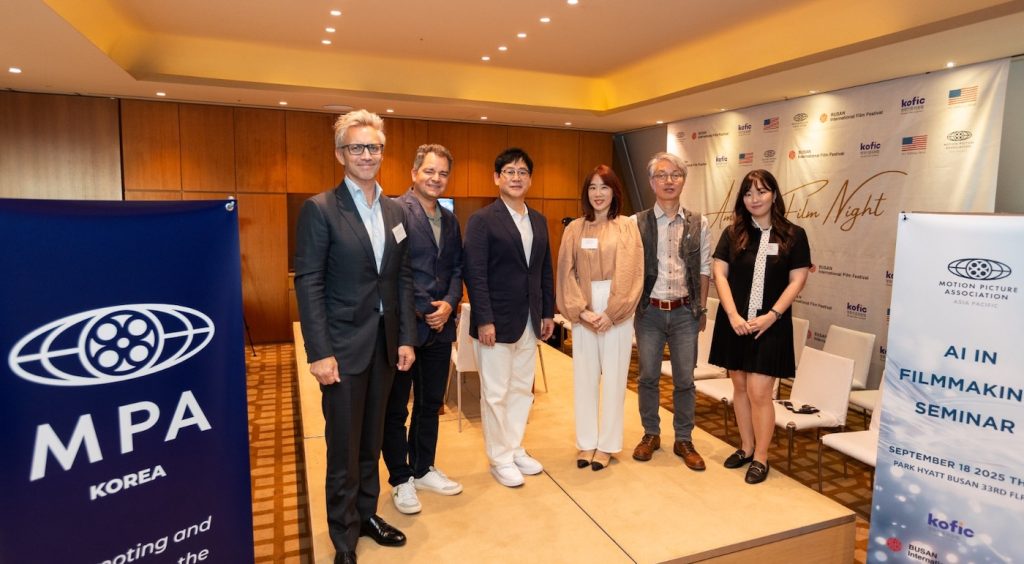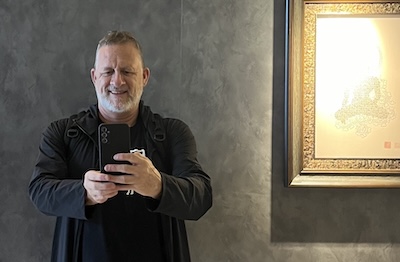From “Ice Age” to AI: Filmmakers at Busan Weigh Opportunities and Concerns for Creative Industries
Carlos Saldanha could well have been speaking for many of those gathered on the sidelines of this year’s 30th Busan International Film Festival (BIFF) when the filmmaker behind such cutting-edge animated hits as Ice Age: The Meltdown (2006), Rio (2011), and the Oscar-nominated Ferdinand (2017) turned his attention to the growing influence of Artificial Intelligence across the creative industries.
The Brazilian, among the generation of animators who were among the first to adapt CGI techniques to their creations, through his work at Blue Sky Studios, explained that he was still just starting to explore the pros and cons of these rapidly evolving advances in technology at present.
“AI for me is a novelty; I’m starting gradually,” said Saldanha. “I am highly interested, and as I engage with directors and creators who extensively utilize AI, I am fascinated by how it can be leveraged as a powerful tool for enhancing work, improving efficiency, and addressing the constant constraints of time, budget, and resources, which are often bottlenecks in the creative process. But I only use AI processes very cautiously and when I truly need to find a solution that I currently don’t possess.”
The impact AI is having was always bound to form part of the conversation at this year’s BIFF. Billed as Asia’s pre-eminent annual cinema industry gathering, the South Korean festival has for 30 years now prided itself on having its finger on the pulse of developments throughout the region – and often beyond – as much as it promotes the work of the region’s emerging talent.
AI is a hot topic across Asia, as elsewhere, as work continues towards ensuring best practices are followed with the use of the technology, especially in terms of safeguarding intellectual property, as well as the rights of those working within the creative and innovation industries.
The Motion Picture Association’s “AI in Filmmaking Seminar” was held in the lead-up to the MPA-KOFIC American Film Night and the announcements of this year’s Korea Location Short Film Competition.
“At the MPA, we believe deeply in encouraging constructive, thoughtful conversations around new technologies and how they intersect with the art and business of storytelling. AI is no exception,” explained Urmila Venugopalan, the MPA’s president and managing director for the Asia-Pacific region, in her opening remarks. “That’s why it is so important for us to come together at forums like this – to share perspectives, raise questions, and consider how best to move forward. We believe AI, used responsibly, can enrich audience experiences and open new frontiers for storytelling.”

The seminar aimed to address and explore such issues by gathering four representatives from across the industry to share their experiences with implementing AI, discuss potential uses of the technology, and identify areas where they had identified possible opportunities and concerns.
Guiding the discussion was Sohee Kim, a senior reporter covering Asia’s entertainment industry for Bloomberg, based in its Seoul office, who charted a course through the impact AI was already having, to what panelists thought lay ahead.
For his part, Saldanha remains intrigued, if tentative.
“I believe that [AI] could save time for me personally in terms of preparing and pre-visualizing shots, and getting ready for a shot, [but] It hasn’t solved some problems yet, as I still have resolution issues, including in terms of quality and consistency, but I believe it is only a matter of time,” said Saldanha, whose most recent projects have included series for Netflix (Invisible City in 2021) and Hulu (How to be a Carioca in 2023) and Disney’s 100 Days, a biopic about Brazilian explorer Amyr Klink, set for a release in late 2026.
Korean Antonia Kim prides herself on being among the early AI embracers, through her work as director/founder, and CEO of the Seoul-based independent production company Aitonia, an office that surrounds her with generative AI “colleagues.”
“It seems that the more I worked with many people, the lonelier I felt,” said Kim. “If I think about the reasons, when it comes to work, there is a very clear vision in my head, so it’s really difficult for me to compromise. So in the midst of all that, now AI appeared, and the biggest change for me now is that I think I am forming a multiverse with AI. The biggest advantage of AI is that it thinks there are no jobs that it cannot do.”
Kim’s most recent work includes the award-winning shorts CHOON and The Day I Saved a Fish, and she explained how she creates via “a proprietary optimized chatbot and a team of thirteen ‘AI employees’ with specialized creative roles.”
“I am truly doing everything freely without any borders. So, I think AI is a framework that really breaks stereotypes,” said Kim.
Daniel Son has built a career as a ground-breaker in Korea’s VFX industry, founding the Seoul-based studio Westworld Co., Ltd, and gaining acclaim for his work on the hit horror Exhuma (Best Visual Effects winner at the 18th Asian Film Awards) and the war epic Ode to My Father (Special Award for Advanced Technology at the 52nd Grand Bell Awards).
Son explained how AI had enabled his company to expand and had freed employees from mundane work, giving them more time to be creative.
“Ultimately, the market can become bigger through AI, so we have no choice but to work through AI, and we are continuously preparing for this,” he said. “This is not just about VFX, but also clearly being gradually integrated in various fields of production environments, so when it all comes together, I think that soon staff everywhere will be using AI.”
Moderator Kim posed the question of how creators would ensure AI content wouldn’t be easily identified as AI-produced work, and Jae Huun Ahn, director of the Studio Meditation with a Pencil animators (The Shaman Sorceress and the upcoming Gill), explained it was an issue that faced all studios.
“It seems like a very challenging task to utilize AI without losing uniqueness and independence,” he said. “How can one use this tool in animation while still being able to achieve those aspects that are touched by human hands in the end? I have been thinking about these concerns a lot. When you look at what this provides, by eliminating some of the processes in the earlier planning stages and at the end handing it over to people, can animation provide efficiency in certain tasks and also still offer the charm that people can provide?”
Ahn revealed generative AI had already made significant changes to his studio’s end product. “In the past, when watching animation, you could see Hollywood-style character expressions and Japanese expressions,” he said. “Our studio has often pondered what such a Korean form might be like. Interestingly, through AI, it seems that we now have many tools to expand on those aspects a bit more. There are very fast solutions, and AI provides that great element of surprise.”
Although there was considerable optimism, concerns also arose, particularly regarding issues related to IP protection. “Big projects, big studios, have legal issues concerning whether what you have created is performing someone else’s work – and how that question [of ownership] exists in people’s minds,” said Saldanha. “How to make what you use safe, how to perform with it – these are always going to present big questions.”
What Kim also wanted to share was that though she may work in an office surrounded by those ‘AI employees’, there’s never any doubt as to who is running the show.
“AI itself won’t create anything because it will always be humans as masters driving it, leading to very new forms of companies that we have never heard of, and new forms of art, and new forms of stories emerging,” she said.
Featured image: BUSAN, SOUTH KOREA – SEPTEMBER 18: Lee Byung Hun, Son Yejin, Park Hee Soon, Lee Sung Min, Yeom Hye Ran and Director Park Chan-wook attend an open talk for “No Other Choice”, during the 30th Busan International Film Festival at Busan Cinema Center on September 18, 2025 in Busan, South Korea. (Photo by Woohae Cho/Getty Images)



